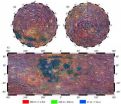(Press-News.org) (Boston) – Researchers from Boston Medical Center (BMC) and Boston University School of Medicine (BUSM) have identified unhealthy substance use as a risk factor for not receiving all appropriate preventive health services. The findings, which currently appear in BMJ Open, identify unhealthy substance use as a barrier to completion of mammography screening and influenza vaccination.
Cancer and influenza are among the leading causes of mortality in the United States. Influenza is preventable, in part, through vaccination, and mortality from cervical, breast and colorectal cancer can be reduced through routine screening. Nevertheless, many eligible U.S. adults do not receive these recommended preventive services, in particular, low-income persons, racial and ethnic minorities, the uninsured and the foreign-born.
Despite this knowledge, and the implementation of interventions targeting these groups, preventive services are still underused, which has led some to believe that high-risk "pockets" of the population may account for gaps in service receipt.
"Persons with unhealthy substance use (for alcohol, the spectrum that ranges from risky use to dependence; for drugs, the spectrum from any illicit drug use, including prescription drugs to dependence), represent one such "pocket," said lead author Karen Lasser, MD, MPH, a primary care physician at BMC as well as an associate professor of medicine at BUSM.
The researchers analyzed data from 4,804 women eligible for mammograms, 4,414 eligible for Papanicolou (Pap) smears, 7,008 persons eligible for colorectal cancer (CRC) screenings, and 7,017 persons eligible for influenza vaccination. All patients were screened for unhealthy substance use.
Among the nearly 10,000 patients eligible for one or more of the preventive services of interest, 10 percent screened positive for unhealthy substance use. Compared to women without unhealthy substance use, women with unhealthy substance use received mammograms less frequently (75.4 percent vs. 83.8 percent), but Pap smears no less frequently (77.9 percent vs. 78.1 percent). Persons with unhealthy substance use received CRC screenings no less frequently (61.7 percent vs. 63.4 percent), yet received influenza vaccination less frequently (44.7 percent vs. 50.4 percent). "We speculate that persons with unhealthy substance use who are not engaged in primary care at the high thresholds used in these analyses may have substantially lower receipt of preventive services," said Lasser.
According to the researchers future interventions to promote mammography screening might target women with unhealthy substance use, and those to promote influenza vaccination might target both men and women with unhealthy substance use. "Clinical interventions could embed mammography screening and influenza vaccination in other services delivered to individuals with substance use problems. In addition, training interventions could enhance skills and systems for health care personnel who screen for substance use disorders to include referrals for preventive health services," she added.
### END
Study finds unhealthy substance use a risk factor for not receiving some preventive health services
2011-05-14
ELSE PRESS RELEASES FROM THIS DATE:
Study finds therapies using induced pluripotent stem cells could encounter immune rejection problems
2011-05-14
Biologists at UC San Diego have discovered that an important class of stem cells known as "induced pluripotent stem cells," or iPSCs, derived from an individual's own cells, could face immune rejection problems if they are used in future stem cell therapies.
In today's advance online issue of the journal Nature, the researchers report the first clear evidence of immune system rejection of cells derived from autologous iPSCs that can be differentiated into a wide variety of cell types.
Because iPSCs are not derived from embryonic tissue and are not subject to the federal ...
Crowdsourcing science: Researcher uses Facebook to identify thousands of fish
2011-05-14
Toronto, ON – Facebook is well-known for connecting friends, publicizing events and allowing people ample space to procrastinate online.
But recently, a scientist at the University of Toronto Scarborough (UTSC) helped illuminate a powerful new use for the social networking tool.
In January, UTSC PhD candidate Devin Bloom helped conduct the first ichthyological survey on Guyana's remote Cuyuni River. Led by Oregon State University's Dr. Brian Sidlauskas, the goal was to find out which species of fish live in the Cuyuni and get a good estimate of their abundance.
During ...
Gainesville, Georgia, Spa Wins LNE & Spa Award for Most Outstanding Green/Wellness Spa in 2011
2011-05-14
On April 3, 2011, The Spa on Green Street received a distinguished honor when they were announced as the grand winner of the new Les Nouvelles Esthetiques & Spa Award. Recognized for their excellence in the green/wellness category, The Spa on Green Street emphasizes the importance of preventative care, lifestyle changes, ongoing fitness programs, and environmental responsibility.
Dedicated to the sustained health of their guests and the environment through education and individualized and group programs, The Spa on Green Street is committed to finding ways to improve ...
2 defective proteins conspire to impair the nerve cell's 'powerhouse' in Alzheimer's disease
2011-05-14
Two proteins that are abnormally modified in the brains of patients with Alzheimer disease collude, resulting in ill effects on the crucial energy centers of brain cells, according to new findings published online in Neurobiology of Aging.
The research raises the possibility that pathological forms of two proteins, amyloid beta and tau, which make up the pathological hallmarks of the brains of Alzheimer patients – plaques and tangles – may work in tandem to decrease the survival of brain cells.
The findings come as part of a bundle of results from several laboratories ...
MIT research: Toward faster transistors
2011-05-14
CAMBRIDGE, Mass. -- In the 1980s and '90s, competition in the computer industry was all about "clock speed" — how many megahertz, and ultimately gigahertz, a chip could boast. But clock speeds stalled out almost 10 years ago: Chips that run faster also run hotter, and with existing technology, there seems to be no way to increase clock speed without causing chips to overheat.
In this week's issue of the journal Science, MIT researchers and their colleagues at the University of Augsburg in Germany report the discovery of a new physical phenomenon that could yield transistors ...
The ties that bind: Grandparents and their grandchildren
2011-05-14
Close your eyes for a moment, open your treasure trove of memories and take a step back in time to your childhood. Do you remember your grandfather gently scooping you up into his warm and comforting embrace? Or sitting by your grandmother's side as she lovingly baked pies chock full of delicious, juicy warm apples sprinkled with crumbly cinnamon bits?
The bond between grandparents and their grandchildren seems to be a magical one, and now, a new article published in the April issue of Current Directions in Psychological Science, a journal of the Association for Psychological ...
Scientists design new anti-flu virus proteins using computational methods
2011-05-14
A research article May 12 in Science demonstrates the use of computational methods to design new antiviral proteins not found in nature, but capable of targeting specific surfaces of flu virus molecules.
One goal of such protein design would be to block molecular mechanisms involved in cell invasion and virus reproduction.
Computationally designed, surface targeting, antiviral proteins might also have diagnostic and therapeutic potential in identifying and fighting viral infections.
The lead authors of the study are Sarel J. Fleishman and Timothy Whitehead of ...
I know you, bad guy!
2011-05-14
Most people who have had the experience of having pet animals in their houses have the gut feeling that the animals can "recognize" us. They seem to recognize our faces, our voices and our smell. One way or another, they respond to us differently from other people.
Actually, this is not just a gut feeling. Numerous studies have shown that domesticated animals, such as honey bees, chickens, pigeons, sheep, dogs, llamas, penguins, seals, rabbits, horses, lizards and octopuses, can recognize humans individually. The common thing among these animals is that they are exposed ...
Moon's rough 'wrinkles' reveal clues to its past
2011-05-14
Written on the moon's weary face are the damages it has endured for the past 4-1/2 billion years. From impact craters to the dark plains of maria left behind by volcanic eruptions, the scars are all that remain to tell the tale of what happened to the moon. But they only hint at the processes that once acted—and act today—to shape the surface.
To get more insight into those processes, Meg Rosenburg and her colleagues at the California Institute of Technology, Pasadena, Calif. put together the first comprehensive set of maps revealing the slopes and roughness of the moon's ...
Satellite images display extreme Mississippi River flooding from space
2011-05-14
Recent Landsat satellite data captured by the USGS and NASA on May 10 shows the major flooding of the Mississippi River around Memphis, Tenn. and along the state borders of Tennessee, Kentucky, Missouri, and Arkansas as seen from 438 miles above the Earth.
The flood crest of 47.87 feet on May 10, is the second highest rise in recent history; the highest being 48.7 feet in 1937. Five counties surrounding Memphis have been declared disaster areas, and the costs of the flooding are expected to approach $1 billion. The Mississippi River crest continues to move south and ...



